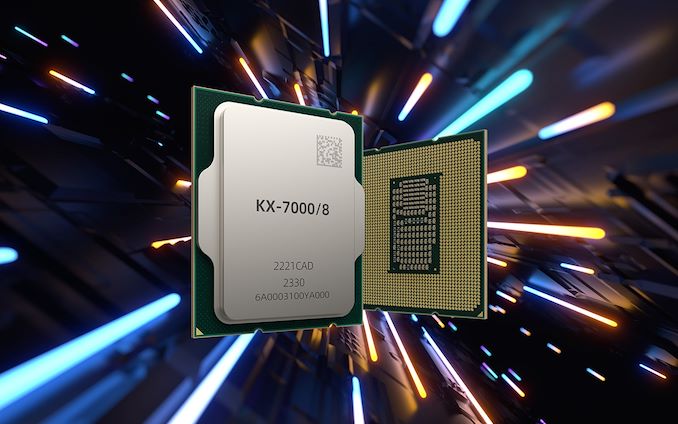
Zhaoxin, a joint venture between Via Technologies and Shanghai Municipal Government, has introduced its Kaixian KX-7000 series of x86 CPUs. Based on the company’s Century Avenue microarchitecture, the processor features up to eight general-purpose x86 cores running at 3.70 GHz, while utilizing a chiplet design under the hood. Zhaoxin expects the new CPUs to be used for client and embedded PCs in 2024.
According to details published by Zhaoxin, the company’s latest Century Avenue microarchitecture looks to be significantly more advanced than the company’s previous x86 microarchitecture. This new design includes improvements in the CPU core front-end design as well as the out-of-order execution engines and back-end execution units. The CPU cores themselves are backed by 4MB of L2 cache, 32 MB of L3 cache, and finally a 128-bit memory subsubsystem supporting up to two channels of DDR5-4800/DDR4-3200. Furthermore, the new CPUs pack up to eight cores, capable of reaching a maximum clockspeed of 3.70 GHz.
As a result, the new CPUs are said to double computational performance compared to their predecessors, KaixianKX-6000 launched in 2018.
On the graphics side of matters, Zhaoxin’s Kaixian KX-7000 CPUs also pack the company’s new integrated GPU design, which is reported to be DirectX 12/OpenGL 4.6/OpenCL 1.2-capable and offers four-times the performance of its predecessor. Though given the rather low iGPU performance of the DirectX 11.1-generation KX-6000, even a 4x improvement would make for a rather modest iGPU in 2024. Principly, the iGPU is there to drive a screen and provide media encode/decode functionality, with the KX-7000 iGPU capable of decoding and encode H.265/H.264 video at up to 4K, and can drive DisplayPort, HDMI, and D-Sub/VGA outputs.
Another interesting detail about Zhaoxin’s KX-7000 processors is that the company says they’re using a chiplet architecture, which resembles that of AMD Ryzen’s processors. Specifically, Zhaoxin is placing their CPU cores and I/O functions in to different pieces of silicon – though it’s unclear into how many different chiplets altogether.
On the I/O side of matters, the new CPUs provide 24 PCIe 4.0 lanes, two USB4 roots, four USB 3.2 Gen2 roots, two USB 2.0 root, and three SATA III ports. And, given the target market, it offers acceleration for the Chinese standard SM2 and SM3 cryptography specifications.
At the moment, Zhaxin is not disclosing where it plans to produce its Zhaoxin’s KX-7000 processors, nor on what node(s) they’ll be using. Though given Zhaoxin’s previous parts the and the limited, regional market for the chips, it is unlikely that they’re intending to use a leading-edge fabrication process.
Perhaps the final notable detail about Zhaoxin’s Kaixian KX-7000 CPUs is that they are set to come in both BGA and LGA packages, something that does not often happen to Chinese CPUs. An LGA form-factor will enable an ecosystem of interchangeable and upgradeable chips, which is something that we have not seen from Chinese processors for client PCs in the recent years.
Zhaoxin says that major Chinese machine manufacturers, including Lenovo, Tongfang, Unigroup, Ascend, Lianhe Donghai, and others, have developed new desktop systems based on the KX-7000 processors. These systems – which will be available next year – will run operating systems like Tongxin, Kylin, and Zhongke Fonde.








